 Home > CR Interviews
Home > CR Interviews CR Sunday Interview: Jessica Campbell
posted July 21, 2012
CR Sunday Interview: Jessica Campbell
posted July 21, 2012

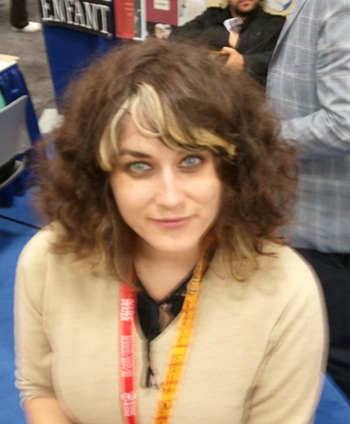
I've known
Drawn and Quarterly's
Jessica Campbell for a few years now, seeing her at various comics-related shows and occasionally having reason to work with her in some capacity. She's resigned her position with the Montreal-based art comics publishing company in order to go to grad school. I think people like Campbell are the backbone of North American comics. It's been my pleasure to know several such folks throughout the years: people that aren't involved in a creative capacity with the comics, at least not primarily, but contribute to the day to day functioning of the industry in hundreds of ways.
Campbell, a talented painter and one of the funniest people in the alt-comics part of the comics world, was nice enough to do an exit interview with me about her time at D+Q. It struck me while talking to her how little I know about that publisher, its culture and inner workings. I greatly enjoyed our talk, and I wish Campbell the best in all future endeavors. Comics will miss her. -- Tom Spurgeon
*****
TOM SPURGEON: Jessica, let's first talk about your leaving. Where are you going? What's ahead? What was that decision-making process like and what finally spurred you to make that decision? Did you always think you'd be there for a certain period of time and then leave, like a lot of comics publishing people, or did you think you might stay around longer than this?
JESSICA CAMPBELL: I started working at D+Q right after I turned 21, first as an unpaid intern, thanking God pretty much every day I didn't get fired. I don't think that I even went to the restroom for the first three months, let alone considered how long I was going to stay. So, no, there wasn't really a conscious plan or anything.
I moved to Montreal to go to art school -- I trained as a painter -- and spent most of my time in school working part time at D+Q and then full time once I graduated. I'm leaving now to go to graduate school at
The School of the Art Institute of Chicago, which I in part decided to do now because my life here is really comfortable and I could easily see myself staying here forever without ever really trying to make a serious "go" of painting.
I might very well end up back in publishing at some point, but I thought, why not get myself in to an obscene amount of debt first?
SPURGEON: [laughs] I remember back in Fall 1998 I told Gary Groth and Kim Thompson I was going to leave Fantagraphics and then I stuck around until like March 1999. I remember that being a weird time. What has the time been like for you since announcing your departure? Has everyone been nice to you? Have you been able to gain some perspective on the time you've spent at D+Q?
CAMPBELL: This is going to be a boring answer, but everyone here has been so unbelievably nice to me since I announced that I am leaving.
Peggy [Burns]'s been emailing people she knows in Chicago to ask for advice on where to live, where to hang out, etc.,
Chris [Oliveros] asked me to let him know if there is anything he can do for me, and
Tom [Devlin], of course, has been making flippant comments that I think secretly mean that he is going to miss me. It's mostly weird being here while knowing I'm going to leave because there are a lot of projects that I'd like to work on for D+Q that I'm not going to have a chance to. I mean, my whole life in Montreal is in a strange state of flux right now because I know that I'm leaving, and D+Q is just a part of that.
 SPURGEON: I don't know much about your comics background, except that Peggy Burns told me you loved them. So what were you interactions like with comics growing up? Were there specific comics you read, or cartoonists you followed, that meant a great deal to you?
SPURGEON: I don't know much about your comics background, except that Peggy Burns told me you loved them. So what were you interactions like with comics growing up? Were there specific comics you read, or cartoonists you followed, that meant a great deal to you?
CAMPBELL: I read a lot of newspaper strips as a kid, particularly
The Far Side and
Garfield. I related a lot to Garfield. So sassy! Always giving everyone the what-for! My dad one day came home with two garbage bags full of
Archie comics from a garage sale, which was great. I also used to read the
Herman and
Doonesbury anthologies we had lying around the house, though I found
Doonesbury pretty impenetrable as a child and
hated Herman. At one point I found my dad's
Fabulous Furry Freak Brothers stash/weed stash and was scandalized.
I had this one
Family Circus comic that I carefully cut out of the newspaper and saved as a kid. It was one of the ones with a map of the neighbourhood featuring Billy's footsteps going all over the place. I remember thinking that I didn't "get" the joke and then saving it so that I could look at it again when I was a little older, in the hopes that I would "get" it then. Anyway, I would unfold it every few years, still not find it funny and put it back in the box until my next attempt. I think one day I realized that the joke was just "kids!"
This is all to say that I didn't start getting seriously in to comics until I was a teenager and worked in a bookstore. My best friend, Alex, was into comics and her dad had a huge collection. I think she was the one who got me into
Neil Gaiman's Sandman, as well as
Dan Clowes and
Love & Rockets and more that I'm not remembering. The
Ghost World movie came out when I was 16, and I loved it and pretty much fell in love with Dan Clowes. When I finally started working at D+Q a few years later, my dream was to get to meet him,
which I finally did in an embarrassing turn of events that Pascal Girard immortalized.
SPURGEON: Is there any story to how you ended up at Drawn and Quarterly?
CAMPBELL: Not really. I think some friends were digging around in the trash around the D+Q offices late one night and found some discarded proofs or something, and it prompted one of them to say to me, "Hey, you should work for Drawn & Quarterly!" [Spurgeon laughs] which I honestly hadn't considered up until that point. Then I applied for an internship and kind of worked my way up to where I am now/just kept showing up.
I worked in bookstores for several years before D+Q (
Munro's books in Victoria, BC and
Paragraphe in Montreal), and had gotten increasingly interested in comics, though I knew relatively little about them compared to what I know now (which is still probably relatively little compared to everyone else in the industry). I know that, when I started, I was eagerly anticipating
Paying For It (that was to come out five years later), and I'd been a big Chester Brown fan since I had a dream about
I Never Liked You as a teenager. Don't worry, though, it was an "above the board" dream.
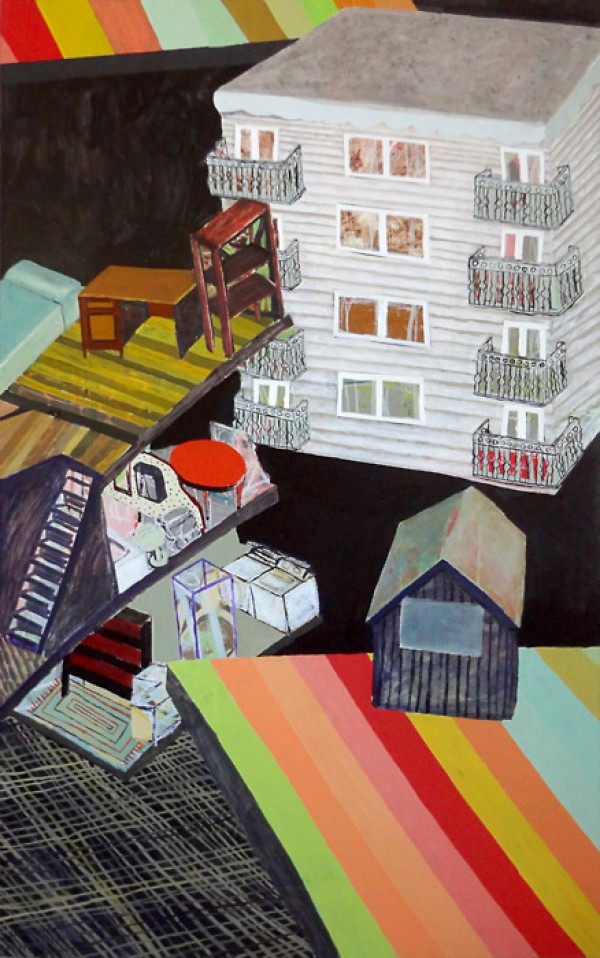 SPURGEON: It's been mentioned by this point, but what is your arts background? I know that you're a painter; I've seen and enjoyed the on-line reproduction of some of your paintings. Did that intersect with comics at all?
SPURGEON: It's been mentioned by this point, but what is your arts background? I know that you're a painter; I've seen and enjoyed the on-line reproduction of some of your paintings. Did that intersect with comics at all?
CAMPBELL: I am mostly a painter, that's what I studied in school, though I've also dabbled in some other arts like installation or telling-jokes-and-calling-it-performance-art (calling it "performance art" is a secret way to get out of having to be funny). I moved to Montreal to go to art school in 2005 and started working at D+Q the next year, ultimately stretching out my degree in a way that I think might only be feasible in Canada.
I've never really made comics, though I very briefly and ill-begottenly tried them for like a week until I gave up, declaring it "too hard," and went back to painting. One time I tried working on a fake submission that I was going to send in to Tom Devlin as a joke, but it started turning in to like 40 hours of work for a B to B+ joke, so I again gave up. My painting, however, is definitely influenced by them. For instance, a lot of my work is of interior home spaces has an isometric perspective that, in part, comes from
Chris Ware's work (the other influence being, of course, video games). Since I work mostly with interior spaces, the kind of work that influences me tends to be related to that. I love
Amy Bennett's painting, and she's married to the cartoonist
Jonathan Bennett, so that's kind of a tangental comics connection.
Seeing
Lynda Barry talk about art production -- painting, drawing, writing, comics, etc. -- really impacted me. Definitely partly her exercises, but also this idea that we've kind of naturalized the idea of art-making as being something that should be left to professionals, when creative production is something that is, in fact, integral to mental health. I met Lynda Barry at a point in my life when I was maybe a little exhausted by the arts, generally, and she completely renewed my enthusiasm.
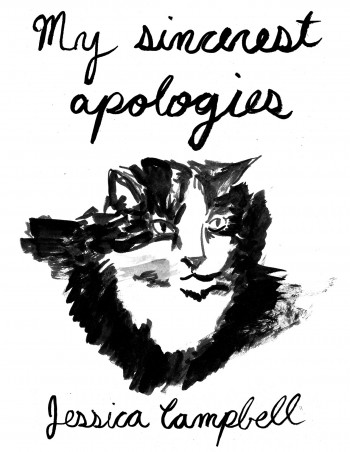 SPURGEON: Does it help working with cartoonists to have a sort of artistic background yourself, if only to garner some perspective on what they might be going through? Are there any ways you see the kind of art you pursue being flat-out different than the experience that comes with being a cartoonist?
SPURGEON: Does it help working with cartoonists to have a sort of artistic background yourself, if only to garner some perspective on what they might be going through? Are there any ways you see the kind of art you pursue being flat-out different than the experience that comes with being a cartoonist?
CAMPBELL: One of the things that makes D+Q such a great place to work is that Chris Oliveros is a cartoonist and comes to publishing from an artist's perspective. I think this means he's really interested in producing the books that the artists want, in giving them as much room as he possibly can to do whatever they'd like (I imagine this is probably true of working with someone like
Eric Reynolds at Fanta, too). Anyway, I think Chris' attitude really sets the tenor of the whole office and we've all been trained to defer to the artists as much as is feasible, which is wonderful. As far as my personal artistic background is concerned, I guess I'd think that it makes me better at things like colour correction or whatever, and of course I'm genuinely very very excited to get to work with so many talented and interesting artists, many of whom I've studied in school.
SPURGEON: Someone told me that you once escorted Lynda Barry around on an initial comics-related PR tour -- in fact, I think this might have been something you did fairly early on in your time there. First of all, what is Barry like to work with on that fairly focused level? She seems like a fairly intense individual in random encounters. What is that kind of work like? It doesn't seem like there's a lot of structure to working with an artist on something like that, and I wondered how you approach supporting someone in that way.
CAMPBELL: I went on a mini tour with Lynda in 2008, after I'd been at D+Q for two years.
SPURGEON: [laughs] Whoops.
CAMPBELL: I'd been to shows before, but I'm pretty sure that was my first time escorting anyone around by myself. It was a week before I was going to go to the Arctic for the summer, and I was unbelievably stressed out and nervous, terrified that I would offend Lynda somehow and ruin her relationship with D+Q. It was only my second time in NYC and I think I got to her hotel an hour before our meeting time and just kind of nervously circled the block until it was time to meet. When we finally met up, she said "I can't believe I'm finally seeing you in person!" and got me to spin around so she could "have a good look," which kind of immediately put me at ease.
Lynda does have a big personality. I remember, for instance, Chris coming back from meeting her for the first time when she was at CCS and being totally awestruck. I think he said something like "She hummed 'You Are My Sunshine' in front of the whole auditorium, and, even with her mouth closed, she managed to fill up the whole room and enrapture everyone." which I can definitely vouch for. But when you spend time with her one-on-one, she has this way of making you feel totally valued and interesting. It's not just with me, as someone who was escorting her around for a week, but for every person who gets a book signed by her or goes to her workshops or just meets her. I don't think it's disingenuous, either. I think she actually is really
interested in people, and it comes through in her interactions as well as in her work. It's part of what makes her work so relatable and beautiful. She's definitely unlike anyone else I've ever met before, and thinking about her makes me hurt a little bit because I love her so much.
SPURGEON: This may sound like sort of a rudimentary question, but what is the D+Q office like? What's the culture there? Is it a quiet office, a chatty office, a close office...? I don't think I have any idea beyond projecting how you guys come across when you're on the road together. Has it been a good place to work?
CAMPBELL: As I am writing this, we are all sitting in silence working on various things. The office tends to be fairly quiet, though Tom, Peggy and I are all loud from time to time, with Chris, Tracy [Hurren, production manager], Julia [Pohl-Miranda, editorial manager] and Ann [Cunningham, controller] maybe a little quieter. We work in a big loft space and Tom generally plays music, which is great except for sometimes when he's on a "complete BeeGees catalogue" kick. We email each other
a lot. Like, all day long I am e-mailing Tom who sits, oh, about five feet away from me. I make it a personal goal to try to crack up my coworkers, to varying degrees of success, and we all agree that the gold standard of office jokemanship is when you get a knee-slap out of the chief.
We are all friends, and I think we all get along well. Obviously we spend
a lot of time together and I'm a deadly combination of "sort of a bully" and "very sensitive" so it's pretty much a miracle that there isn't a ton of explosive conflict all of the time. And as far as I can remember, Tom's only made me cry once (though you might want to check this number again before you run this). Chris is maybe the kindest person I have ever met in my life, and he's a thoughtful and caring boss. I have never had a better boss in my life, nor do I expect to ever have a better one in the future. He's incredible.
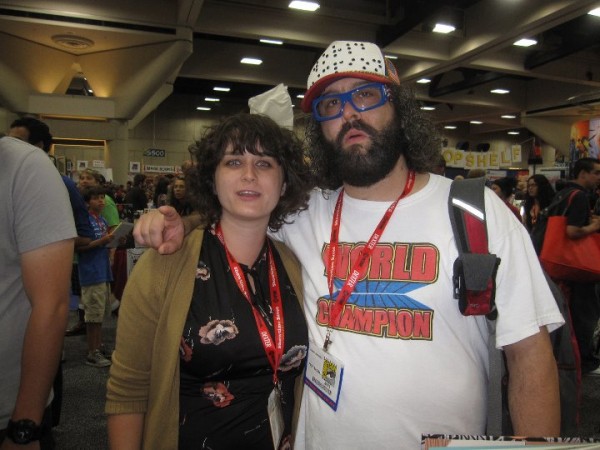 SPURGEON: One thing I know you've done, and probably the only place we've ever interacted, is at shows. Can you talk a little about supporting D+Q and working a booth at places like San Diego? Are there specific memories you have, particularly memorable encounters or days you spent doing that kind of work. What are D+Q fans like face to face?
SPURGEON: One thing I know you've done, and probably the only place we've ever interacted, is at shows. Can you talk a little about supporting D+Q and working a booth at places like San Diego? Are there specific memories you have, particularly memorable encounters or days you spent doing that kind of work. What are D+Q fans like face to face?
CAMPBELL: San Diego is a strange show for us because 90% of the people there are not interested in the kind of work that we put out, and like every third person is some Hollywood guy asking you to pitch him -- though I've actually felt this less in the past few years. I like to go because it's just totally mind blowingly different from my normal life, and while the majority of people there don't maybe care about what we do, the D+Q fans who do go are always really excited to see us and fun to interact with. Last year was interesting because we had advances of
Kate Beaton's book, which brought different people to the table, people who may not have read our other books but who were so enthusiastic and kind about Kate, even after we sold out of her books (which happened quickly). Our readers are, as a whole, great, and any kind of negative experiences I've had at shows are few and far between.
One time I saw a furry come face-to-face with a golden retriever right in front of our booth at SDCC and I wasn't sure whether they'd kiss or fight one another, so that was a pretty great moment. My favourite memory might have been from SDCC last summer when, after a series of escalating dares,
Anders Nilsen, Brian Ralph, Tom Devlin, Tracy Hurren and I all broke on to a pier and went swimming in the disgusting downtown San Diego harbour.
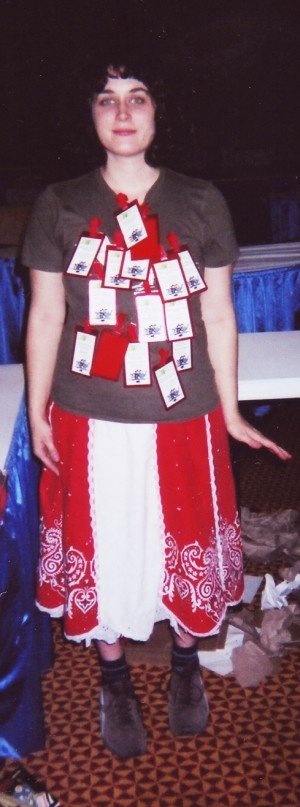 SPURGEON: I'm not sure how much you can talk about a place like D+Q in terms of it being part of the traditional comics industry, but certainly the wider industry of which you're apart shares a reputation as being a place that can be tough for a woman, a maybe not-always-friendly arena in which to work. Is that fair? Do you have perspective on that kind of general industry characterization? You guys have always had a lot of women on staff and published through the company, but that's not the case for everyone.
SPURGEON: I'm not sure how much you can talk about a place like D+Q in terms of it being part of the traditional comics industry, but certainly the wider industry of which you're apart shares a reputation as being a place that can be tough for a woman, a maybe not-always-friendly arena in which to work. Is that fair? Do you have perspective on that kind of general industry characterization? You guys have always had a lot of women on staff and published through the company, but that's not the case for everyone.
CAMPBELL: I should start off by saying that there's rarely a week where I don't talk to someone about how amazing it is to work in such a feminist/queer friendly/radical environment. Not that the numbers necessarily have anything to do with it but there are seven of us in the office, two men and five women, and comparable numbers for our bookstore, and that's without even mentioning all of the diverse artists we get to work with. I have no idea about other publishing houses in the biz, but D+Q does feel remarkable compared to some of the other places I've worked over the years.
The industry-at-large is something that feels somewhat unknowable to me and to which I can't speak completely intelligently. I mean, it consists of a broad swath of works/people/companies and the area I'm familiar with is, relatively speaking, fairly small. However, as "being unable to speak intelligently to something" has never stopped me before, here I go!
A few years ago when I attended a panel discussion between
Dan Nadel and
John Carlin (curator of the "
Masters of American Comics" exhibition), moderated by
Robert Storr, I was struck by how much of the conversation revolved around the role of women in comics. I was already familiar with the controversy surrounding the fact that Carlin's exhibition, created with the explicit intent of solidifying the "comics canon," had not included any female creators, though this controversy had at points felt blown out of proportion. Then, upon being asked directly about his chose to omit female cartoonists, Carlin claimed that to include any would have been "tokenism." Certainly he acknowledged that there exist and have existed female cartoonists, though he said (perhaps I am paraphrasing slightly) "there has never existed a female
Milton Caniff." What he meant, really, was there has never been a female "master" of American comics (a telling choice of words to be sure).
His position is not dissimilar to what was for a long time the status quo in art history, and something I once read by art historian
Nanette Salomon, that "the 'exceptional' woman artist may be one of the most insidious means of undermining the likelihood of women entering the creative arts,"* seems particularly relevant to both Carlin and the medium. In comics, as in art history, when women's artistic production is described, it is very often qualified by their sex, thus highlighting its otherness and exceptionality. By consistently qualifying the work of female artists by their gender, one implies that somehow the fact of her gender is remarkable. The implication is that her femaleness is her handicap and that her work does not fit in to the history of art but is, rather, an anomalous exception to it.
The canon of comics, still new and somewhat amoebic when compared to the canon of art history, seems very much predicated on the idea of artistic lineage and the "mentor/prodigy" relationship perpetuated by traditional art history. Carlin's statement about the impossibility of a "female Caniff" highlights another point of Salomon's: that comparing all female artists to some kind of greater male counterpart does them a disservice. This idea, that women artists must always be tied to a male artist, reinforces a binary system where one is always prized over another. This, too, hints to why I was so disappointed by the discourse surrounding Carlin's exhibition. Certainly, there was a level of outrage at his lack of inclusion (no female creators, one black creator and only two female historians in contrast with around thirty white male creators and historians), but the strategy that people used to deal with this was to provide a list potential female creators who could have been included. This form of rebuttal ultimately kind of reinforced binarism, since it was refuted by exhibitions supporters by comparing these female creators to their superior male "counterparts."
Primarily, what disappointed me about this "canon constructing" exhibition was the notion that we need a comics canon based on the model of art history at all, and that, though this canon is being constructed in the 21st century, it must incorporate all of the biases of its predecessor in other media, in lieu of adopting contemporary or alternate strategies.
I should say that I don't mean to pick on John Carlin here, by any means, but this particular exhibition seemed to be symptomatic of some underlying issues about the way that we talk about women in comics, or that we talk about "women in comics" at all. The dialogue seems often to focus on the symptoms of what is actually a systemic problem, and I wonder if there might be more productive way of addressing these issues beyond having a "Women in Comics" panel at every convention.
As far as being a woman
working in the industry goes, it is, for the most part, wonderful. In work as with my normal life, my "gender" is not something that I consciously think about very often. However, I will note that going to big mainstream shows, particularly ones that are more Hollywood/pop culture and less comics, can be somewhat disheartening. Perhaps this goes without saying, but I usually end up feeling marginalized at these shows in way that I do not at the other small press shows, craft fairs and book festivals that we attend. While at first surreal and amusing, the scantily-clad women hired to be ogled and seem to be symptomatic of something darker and ultimately propagate inequality, naturalize it. Frankly, I think that what these egregious displays of female objectification/gender imbalance are most guilty of is masking or drawing attention away from more surreptitious ones. A joke or subtle comment seems minor in comparison to a man motioning to a woman a third his age in a bikini and yelling into a megaphone "this is why you don't get married!," yet these jokes and subtle comments are what ultimately shape societal convention and personal opinion.
[* Salomon, Nanette. 1998. "The Art Historical Canon: Sins of Omission" in D. Preziosi ed.
The Art of Art History: A Critical Anthology, Oxford University Press, New York.]
SPURGEON: I enjoyed your participation in a recent Robot 6
roundtable about books you're reading. What is your comics reading like? How much of that are you going to maintain now that you're no longer going to be doing that kind of work day to day? Do you have favorites of the work you've encountered while there?
CAMPBELL: I'm a terrible comics reader. I read comics long after they've come out and in no discernible order. I'll read the new
Love & Rockets (actually those are pretty much the only thing I'm guaranteed to read immediately as they're released), and then I'll read some Peter Arno collection, then I'll read a pile of mini comics… It's really contingent on whatever I have access to at any time. Beyond just reading books in any order, I actually am pretty sure that the mechanics of my reading are all wonky. I've noticed, for instance, that I'll read all of the word balloons and then go back to look at the images, which is probably pretty wrongheaded. But I can't help it!
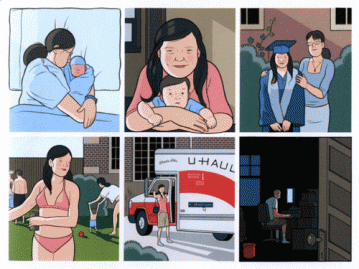
My bad reading is the reason why, when I first started getting in to comics, I couldn't read Chris Ware's work. I remember I just couldn't figure out
how to read them, and they made me nauseous to look at because they were so beautiful and complex. I had this really visceral reaction to them, and it took me another few years of reading more straightforward, black and white comics before I could back to them. Of course, when I was finally able to read them, they were a revelation. Beyond just being beautiful and moving works of art, they changed how I read, in a way that I think
Acme 20 summarizes nicely. Throughout the telling of Jordan Lint's life, the drawing evolves to mirror his changing experience or interpretation of the world, and at the end of the book, it completely breaks down, mimicking his experience of death. It is impossible to read this book the "bad way" that I'm inclined towards. It's like Chris Ware teaches you how to read, creates a new way of reading, and then ultimately tears it all apart.
I also
love Seth's work, particularly
George Sprott, to the point that my coworkers have kind of a running joke that I'm always trying to push it on people at the conventions. It's beautiful and well-written and inventive. I've often compared Seth to
Borges (which maybe he would hate but thankfully the cartoonist don't tend to hear us selling their work at the shows); there's something about their work that I find really relates, the mock objective tone, the interest in/obsession with literature, a melding of fact and fiction... It's hard for me to pick favourites, but I guess Seth's work is probably what I find myself recommending the most.
SPURGEON: You mentioned early on your work with bookstores. Is that experience pertinent to how you operate with the publisher? Is there anything about what bookstores do with comics that you wish more comics publishers knew?
CAMPBELL: While I was a book buyer for a few years, my comics knowledge was definitely spotty. While I was at that store (2002-2005), I watched it grow from having a single GN in the store (
Ghost World) to having a proper graphic novel section for which I was the assistant buyer. I'm sure this isn't true for the majority of book buyers, and certainly not for comic shop peeps, but I always felt kind of like I was groping around in the dark trying to find out about books, what we should carry, what was new, etc. We were still placing all of our orders via fax and picking books directly from catalogues, and I imagine that ordering/keeping on top of things nowadays is a little easier.
The GN sections at both bookstores where I've worked have been weird, missing a lot of things and/or including a lot of things that maybe shouldn't be there. For instance, we would have been a lot more likely to buy graphic novels by novelists or literary adaptations than we would be to carrying a book by a new cartoonist. And, as everyone in comics know, distribution is always an issue. Since I was ordering French comics, I was going through different channels than a lot of retailers in North America, but I remember spending
months trying to figure out how to get books by
L'Association in the store, and most book buyers probably don't have the time to do something like that. Not that I have a viable solution or anything. Having a retailer database helps, being in direct contact with the stores. Oh, and one time
McSweeney's sent us (Munro's) a pizza, which pretty much endeared them to us for life.
(Dear God, this is terrible advice. "Send everyone a pizza"? What is that?)
SPURGEON: I believe you read French, and that you have some interest in some of the French cartoonists and the way that industry operates. Is there any secret or key to getting more translated French-language work over with North American readers? Is that even a fair question?
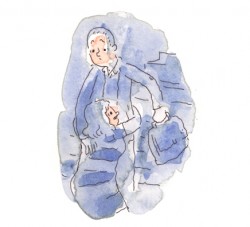 CAMPBELL:
CAMPBELL: Hm, I don't know if I really have much insight in to French comics or the industry or whatever. I started an extremely unsuccessful French comics section at the bookstore where I worked as a teenage, but I think I just ordered things willy-nilly, based on whatever the Fichtre (a wonderful Montreal comics store that unfortunately closed down a few years ago) website recommended. I ambitiously ordered an encyclopedia of French comics around that time and decided that I was going to study it and really
learn everything there was to know about that world. Now that encyclopedia rests at the bottom of a (much-begrudged-by-my-mother) cardboard box in my parents' basement, along with all my other broken dreams.
Some book sell better in English, some sell better in French and I pretty much don't understand why. I know that there are a lot more fantasy comics in the French industry than there seem to be in English, and that there are some stylistic differences (their comics seem to be sexier, the drawing is often looser, maybe?), but I think I would have a hard time characterizing this accurately.
SPURGEON: If you could have a brief chat with the Jessica Campbell that walked into D+Q the first day from the perspective you have now, is there anything you'd want her to know?
CAMPBELL: Sometimes Tom will make you cry, but know that it is he who is really hurting on the inside. Also, though you may not believe it now, crotch-hugging Dan Clowes will, mysteriously, not get you fired, so, have at it!
*****
*
Jessica Campbell
*
Drawn And Quarterly
*****
* photo of Jessica Campbell in 2010 by Whit Spurgeon
* Campbell in high school with her close pal
* a Campbell painting
*
a Campbell 'zine; this has to be terribly funny
* Campbell at a San Diego with the actor and comedian Judah Friedlander
* Campbell at an Ignatz Awards ceremony
* from Chris Ware's
ACME Novelty Library #20
* Campbell crotch-hugging Dan Clowes
* image sent to me by Campbell, as is (below)
*****
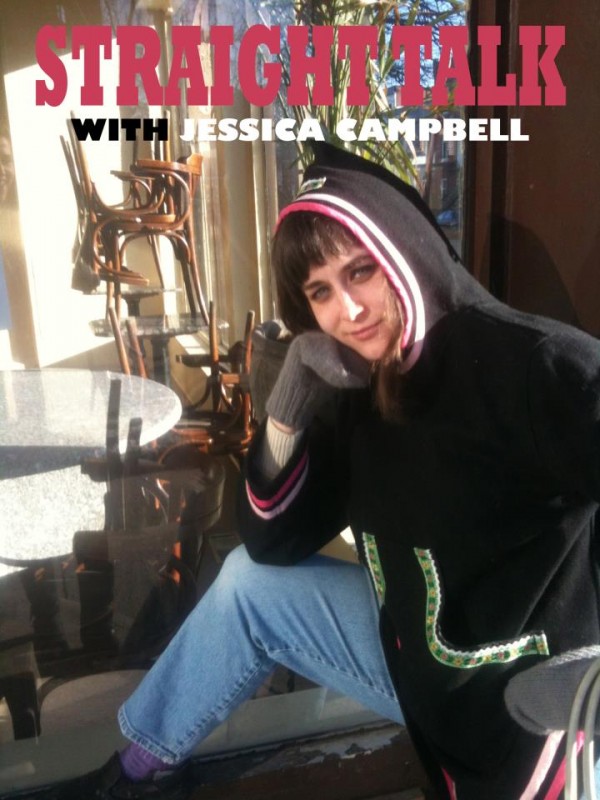
*****
*****


